

11 - Israel restored after the Babylonian captivity. Israel restored Biblical Archeology following the Babylonian Captivity Just as the prophet Jeremiah had warned, the city of Jerusalem fell to the Babylonians in 586 BC. - King Zedekiah tried to escape but was captured near Jericho and brought to Nebuchadnezzar’s headquarters at Riblah where his sons were killed before his eyes, and then his own eyes put out.
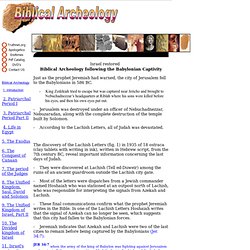
10 - Biblical Archaeology regarding the Divided Kingdom of Israel. Biblical Archaeology regarding the Divided Kingdom of Israel and Judah God predicted the division of Israel to Jeroboam through Ahijah the prophet. - Rehoboam’s unwillingness to reduce Solomon’s heavy tax burden and conscription resulted in the secession of the 10 northern tribes.
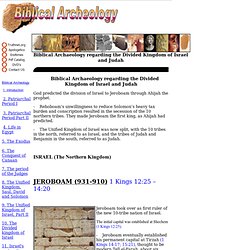
They made Jeroboam the first king, as Ahijah had predicted. 9 - The Unified Kingdom Part II in Biblical Archeology, the Kingdom of Saul, David and Solomon. Even though Saul was dead, David would still not rule all of Israel.
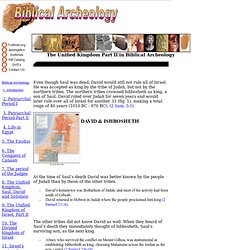
He was accepted as king by the tribe of Judah, but not by the northern tribes. The northern tribes crowned Ishbosheth as king, a son of Saul. David ruled over Judah for seven years and would later rule over all of Israel for another 33 (fig. 1), making a total reign of 40 years (1010 BC - 970 BC), (2 Sam. 5:5). 8 - The Unified Kingdom in Biblical Archeology, the Kingdom of Saul, David and Solomon. The Unified Kingdom in Biblical Archeology Israel was less disturbed by outside powers during the time of the Unified Kingdom than during the period of the Judges.
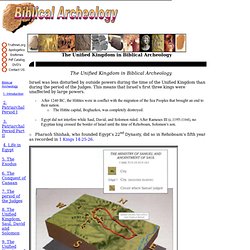
This means that Israel’s first three kings were unaffected by large powers. 7 - Period of Judges in Biblical Archeology. The Promised Land was now conquered, 600 years after God had promised Abraham that his seed would become a nation.
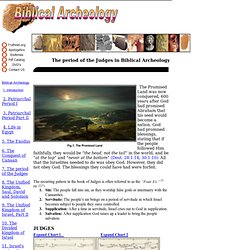
God had promised blessings, stating that if the people followed Him faithfully, they would be “the head, not the tail” in the world, and be “at the top” and “never at the bottom” (Deut. 28:1-14; 30:1-10). All that the Israelites needed to do was obey God. However, they did not obey God. The blessings they could have had were forfeit. 6 - Canaan Conquest in Biblical Archeology. Click to Expand After wandering in the wilderness for 40 years, Moses handed over leadership to Joshua, whose responsibility it was to bring the nation of Israel into the promised land of Canaan.
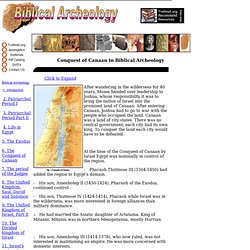
After entering Canaan, Joshua had to go to war with the people who occupied the land. Canaan was a land of city-states. There was no central government; each city had its own king. To conquer the land each city would have to be defeated. 5 - The Exodus, Biblical Archeology during the Exodus Period. According to Exodus 7:7 Moses was 80 years old when he spoke to Pharaoh.
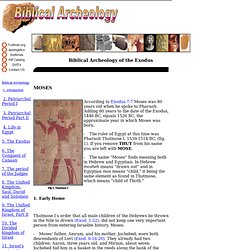
4 - Biblical Archeology during the Egyptian Period. - The most important mention of Israel outside the Bible is that in the Merneptah Stela (fig. 4).
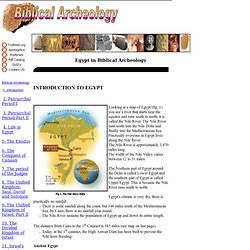
Discovered in 1896 in Merneptah’s mortuary temple in Thebes by Flinders Petrie, the stela is a eulogy to pharaoh Merneptah, who ruled Egypt after Rameses the Great, c. 1236-1223 BC. - Of significance to Biblical studies is a short section at the end of the poem describing a campaign to Canaan by Merneptah in the first few years of his reign.
One line mentions Israel: “Israel is laid waste, its seed is not.” Here we have the earliest mention of Israel outside the Bible and the only mention of Israel in Egyptian records. - This puts Israel as a nation right after the conquest of Canaan by Joshua (1406 BC). Joseph The biblical account in Egypt begins with Joseph. If the Biblical numbers are taken literally the kings during the enslavement and rise to power of Joseph would be Senusret II, fig. 5, (1894-1878 BC) and Senusret III (1878-1841 BC), of the 12th Dynasty. Sold Into Egypt (Genesis 37) 3 - Biblical Archeology during the time of the Patriachs. In Genesis 11:31, we read that “Terah took his son Abram,” and departed “from Ur of the Chaldeans,” suggesting that Terah, the father, was the one who led in the departure rather than Abraham.
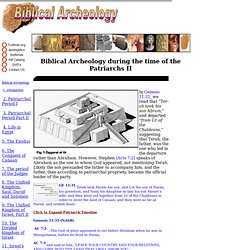
However, Stephen (Acts 7:2) speaks of Abraham as the one to whom God appeared, not mentioning Terah. Likely the son persuaded the father to accompany him, and the father, then according to patriarchal propriety, became the official leader of the party. GE 11:31 Terah took Abram his son, and Lot the son of Haran, his grandson, and Sarai his daughter-in-law, his son Abram’s wife; and they went out together from Ur of the Chaldeans in order to enter the land of Canaan; and they went as far as Haran, and settled there.
Click to Expand Patriarch Timeline Genesis 11:31 (NASB) AC 7:2 …The God of glory appeared to our father Abraham when he was in Mesopotamia, before he lived in Haran, AC 7:3 and said to him, ‘LEAVE YOUR COUNTRY AND YOUR RELATIVES, AND COME INTO THE LAND THAT I WILL SHOW YOU.’ 1. 1. 2. 2 - Patriarchal Age Biblical archeology (Archaeology ) Truthnet. GE 14:1 And it came about in the days of Amraphel king of Shinar, Arioch king of Ellasar, Chedorlaomer king of Elam, and Tidal king of Goiim, Mesopotamia is derived from the Greek words, mesos meaning, “middle,” and potamos meaning “river,” which is known as the “land between two rivers.”
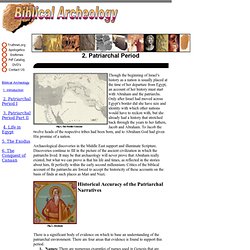
The two rivers are the Tigris and the Euphrates. The word Aram Naharaim is also used to describe this area and is used in Genesis 24:10: GE 24:10 Then the servant took ten of his master’s camels and left, taking with him all kinds of good things from his master. He set out for Aram Naharaim and made his way to the town of Nahor. Genesis 24:10 (NIV) - The Mesopotamia region (see fig. 6 and 10) is about 300 miles long. . - Temperatures vary; it can be in the 70’s to 80’s in the winter, and unbearable in the summer with temperatures reaching between 110 and 120. . - The Mesopotamia area provides no natural barriers. AC 7:2 And he said, “Hear me, brethren and fathers! Genesis 10:10 (NASB) I.
II. III. IV. V. 1 - Introduction to Biblical Archeology. Introduction to Biblical Archeology.